New York, United States 28 July 2006

In part one of a two-part series, Professor Hamid Dabashi reflects on the beauty of a country reduced to rubble by the Israelis and into two dimensions by the news media.

Buying Fruit in Beirut, Lebanon, June 2006 (Photo by Golbarg Bashi)
The time has come
To say fair’s fair
To pay the rent
To pay our share
The time has come
A fact’s a fact
It belongs to them
Let’s give it back
How can we dance when our earth is turning
How do we sleep while our beds are burning
—“Beds are Burning,” by the Australian band “Midnight Oil”
On Sunday 2 July 2006, my wife Golbarg Bashi and I left Beirut at 4:00 am, on a flight to New York, via Istanbul and Paris, having just spent about ten days visiting our friends, colleagues, comrades, publishers, as well as a number of my former and current students.
We were in Beirut in part for work and in part for the sheer joy of being with our friends. Golbarg had decided to expand her work on human rights and women’s rights in Iran to include a wider range of issues and areas, building on her earlier work in Jordan in 1998-1999, and I to work out the details of the Arabic translation of my forthcoming edited volume on Palestinian cinema.
Over the years, I have developed a deep-rooted and inarticulate affection for Beirut (which to my alien and naked eyes it appears as a cosmopolitan extension of its Palestinian refugee camps). If I were to get too metaphysical about this affection, it would probably be because the ashes of my fallen friend, colleague, and comrade Edward Said are buried there, over which a couple of years ago I placed a fistful of Palestinian soil I had snatched from under the nose of its occupiers.
If I were to get a bit meta-geographical about my affection for Beirut, it is probably because something in its cosmopolitan disposition, its recent despairs and its rising aspirations, is very much reminiscent of Iran of the 1970’s. Something about Beirut is uncannily similar to the pre-revolutionary Tehran, when things could have gone right after a massive and grassroots revolution, but alas where things went terribly wrong — when the hopes and aspirations of an entire nation were kidnapped and betrayed by a terrorizing theocracy. My affection for Beirut may in part be due to a hidden hope I harbor that this time around, Lebanon might just get right what Iran did not, that the combination of its sectarian forces, of its obscene but necessary bourgeoisie and its impoverished but hard working masses, might in fact come together to produce a thriving and robust economy, and a corresponding society, polity, culture.
Because the translator of my previous work into Arabic was Syrian, while in Beirut we had intended to travel to Damascus for a short visit — to meet with my translator, editor, as well as other Syrian friends and former students I have there. But this was not meant to be. The day we left Beirut to go to Damascus, Tuesday 27 June, was the day that the Israeli army had marched into Gaza, intensified its barbaric destruction of the Palestinian infrastructure, and also flown, we read later in the papers, a fighter jet over the Syrian president’s palace, where Khaled Mashaal, the Hamas leader, was presumably staying. This meant an inordinate wait at the Lebanese-Syrian border for people who, like me, traveled on American passports.
While Golbarg, who travels on a Swedish passport, had no problem getting an immediate visa, I was told I had to wait for hours, maybe even days, before they decided whether they did or did not give me a visa. Disappointed, we drove back to Beirut. On our way to the Syrian border and back we stopped at Shturah village, famous for a dairy product they call ‘Arisha, which they spread over a very thin piece of bread and mix it with honey — ‘Arisha ma’a ‘Asal, they call it. It is legendary. There were a brother and sister working there in that cafe. They looked like identical twins — youngish but hard working. If you were to reach out to tip them, they turned their faces away in a dignified shyness. They knew how to serve their customers politely but not how to accept any sign of gratitude except a simple “shokran” (“thank you”) or an even simpler smile back at their joyous faces.
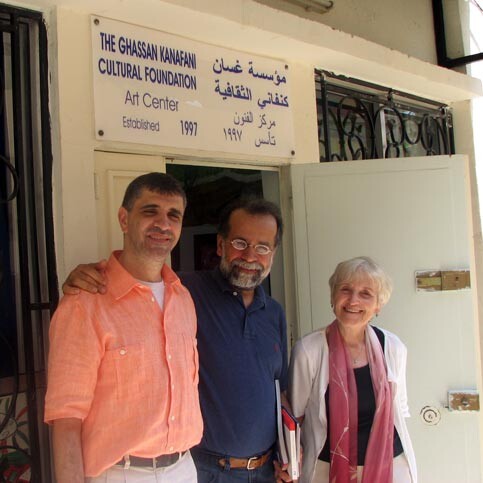
Samah Idriss, Hamid Dabashi, and Anni Kanafani—Beirut, 26 June 2006 (Photo by Golbarg Bashi)
We spent in Beirut the few more days that we were planning to meet our friends and colleagues in Damascus, doing what we were doing for the previous week: Staying with our friends, the distinguished Lebanese historian and cultural critic Fawwaz Traboulsi and his wife Nawal Abboud, a leading social activist chiefly responsible for a series of public libraries she has helped build around Beirut; having our mid-day man’usha at a bakery near the Traboulsi’s (the bakery was run by an ostensibly Shi’i baker catering to an entirely mixed clientele); going to Palestinian refugee camps where Golbarg continued her conversations with a series of human rights organizations; having lunch with our other friends and colleagues at our favorite spot, a seaside restaurant locally known as Rawda (a modest hangout dear to Lebanese intellectuals and literati, but not strange to ordinary people and their ordinary families — all along with their Sri Lankan maids); taking a short nap right there and then, before going for swimming at a nearby beach; then going home, taking a quick shower and going for dinner with more of our Lebanese and Palestinian friends — with Mai Masri, for example, the prominent Palestinian documentary filmmaker, her husband Jean Chamoun, the equally distinguished Lebanese filmmaker, and their children and friends one night, or having dinner at a restaurant by the sea with a leading Lebanese public intellectual, Samah Idriss, who is the Editor-in-Chief of al-Adab, the longest continuously running literary and political journal of the Arab world (that has published Arabic translations of my work), and his wife and colleague Professor Kirsten Scheid, who teaches anthropology at the American University in Beirut.
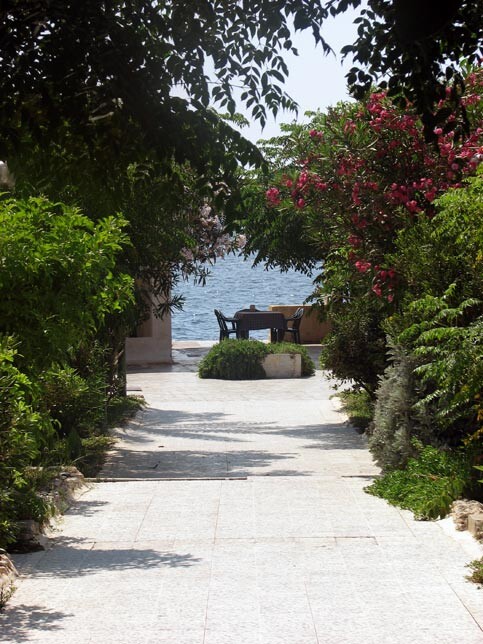
Al Rawda Restaurant, Beirut, Lebanon, June 2006 (Photo by Golbarg Bashi)
My other good Lebanese friend, Ahmad Dallal, Professor and Chair of the Department of Arabic and Islamic Studies at Georgetown University, was also in Beirut with his daughter Shezza, as was Professor Suzanne Elizabeth Kassab, an extraordinary intellectual historian and philosopher who had previously taught at Columbia University, where I teach. Beirut was like home to me, I had told Golbarg earlier that summer, homier even than New York, where we live.
The paramount mood of Beirut in late-June 2006 was the hustle bustle of a thriving cosmopolis. Ours was a privileged perspective — two foreigners familiar with the pulse of the neighborhood, embraced and welcomed by a constellation of friends and acquaintances, comrades and colleagues. Every morning, over coffee and a colorful rainbow of Arabic, French, and English newspapers, we were discussing with Fawwaz Traboulsi, among other things, his forthcoming book on Lebanese history and the courses he was planning to teach next spring as a visiting professor at Columbia. With Nawal Abboud we were discussing her interest in having translated into Arabic a number of children’s books published originally in Persian.
With Mai Masri and Jean Chamoun we were discussing the film festival that Richard Pena and I were organizing in New York to launch my edited volume on Palestinian cinema. With Samah Idriss and Kirsten Scheid we were discussing various issues regarding the journal al-Adab, as well as the publication of the Arabic translation of my Palestinian cinema book. There were too many things to do and too little time to do them. Samah took us to meet Anni Kanafani, one of the most prominent cultural activists and the widow of the legendary Palestinian novelist Ghassan Kanafani — murdered in 1972 by people who don’t like Palestinian novelists, poets, and filmmakers.
Beirut was bustling with activities in late-June 2006, with things to do, friends and colleagues to meet, current projects to work out, new projects to plan. At the Kanafani Foundation in Mar Elias Refugee Camp, Anni Kanafani had just exhibited a series of paintings and other art works by Palestinian children from the camps, and published a corresponding catalogue along with the exhibition. Golbarg conducted a long interview with Anni Kanafani and her colleagues, and then we discussed my forthcoming trip to Copenhagen to talk about Palestinian cinema — Anni Kanafani is Danish and has devoted her life to safeguarding and promoting the legacy of her husband’s literary work.
No — Beirut is (should I now say was? — the verb does not quite turn to conjugate in my angry and defiant mind) altogether too busy for a short visit, too many things to do in just ten days. Once our visit to Damascus fell through, we were able to attend a conference that through al-Adab Magazine and al-Saaha Club, the indefatigable Samah Idriss had organized at Wata al-Musaytbeh and in which spoke Professor Ahmad Dallal of Georgetown University, the equally prominent Lebanese public intellectual As’ad Abu Khalil, Professor of Political Science at the California State University at Stanislaus, and Professor Rania Masri of Balamand University. Above all, and just to name a local legend, if you hang out with Abu Said in Beirut people open their doors for you.
No — Beirut was (is and will always remain) absolutely beautiful — including even its cultic curiosities. Huge posters of Rafik Hariri, a monumental statue of Samir Qasir near al-Nahar offices, the raised arm of Jubran Twayni, the close up of George Hawi — all of them divisive characters, or decisive signs, some adoring them as national heroes and martyrs, others detesting them for their pro-American politics, many managing to ignore them altogether. Hariri had rebuilt Beirut, his admirers said. He had impoverished the country, his detractors objected. To a foreign but caring ear, all these disagreements sounded positively promising.
Public intellectuals doing what they do best, as did politicians, the revolutionaries, the activists, the journalists — the stuff of which civic discourse is made. Noam Chomsky had just been there, giving a series of talks in Beirut. When we left, Fawwaz gave me a CD of Chomsky’s talks to send to a mutual friend in Boston. Beirut was thriving. Lebanon could have been a model of productive ideological conflicts, of civil discourse, progressive politics, foreign investments, domestic contestations, intellectual diversity, moral variations. Beirut was civil, civilizing, cosmopolitan.
Beirut — no — Beirut was (will always be) full of life. For the first time in decades I thought there was hope for Lebanon. There was a fifty-five (or something to that effect)-star Moevenpick Hotel not too far from Rawda on the Corniche that was so spiffy that it would not allow us to use its beach. But a stone throw away from it there was a public beach that was as good and more than happy to welcome you for just about a dollar to rent a carrousel for as long as you wanted, all that plus a running faucet under which you could wash your sands off, and then stand under a shade and look at the beautiful, blue sea, hugging the radiant sky, welcoming men, women, and children — we even saw veiled women there bathing. There was (is, there must always be) a generosity of spirit, a catholicity of caring about Beirut — a tolerance far superior to those of the French legislators, or their counterparts, the bearded monstrosities that rule over the Islamic Republic.
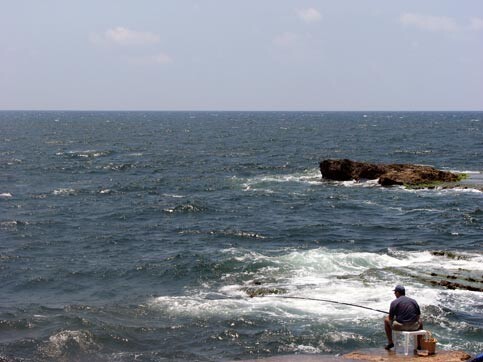
Fishing at the Beach, Beirut, Lebanon, June 2006 (Photo by Golbarg Bashi)
That evening, with Fawwaz and Nawal we went to Mai Masri and Jean Chamoun’s warm, welcoming, and generous home for dinner — all in the company of beautiful minds, joyous hearts, generous spirits, forgiving souls. “I have made you Mosakhkhan, Hamid,” Mai said and pointed to a colorful dish. “Those are beautiful pieces of Mosakhkhan, Mai. Last time I had Mosakhkhan was in Beit Sahour, and it was not as fancy as this!” Smile, laughter, joy, friendship, camaraderie, solidarity, determination, struggle. “We are having a launch of our Palestinian cinema book with a small film festival in New York, Mai. Hope you can come.” “Ahlan wa Sahlan, with pleasure, Hamid.” Home is where people don’t mispronounce your name.
No — definitely Beirut was (yes it was) full of hope. Mai and Jean’s youngest daughter Hana (she is about 10 or 11 year old) was so eager to tell me that she had acted in her father’s new film, In the Shadow of the City (2005) — she rushed to a room and rushed back with a DVD in her hand, pointing to a fine print little HANA CHAMOUN written on the cover. “You are the second little Hana I know who is a great artist.” Who is the other one she asked, smiling, “Hana Makhmalbaf I said. She was just your age when she made her first film.” (What were Ehud Olmert, Amir Peretz, and Dan Halutz doing on the evening of 26 June 2006, when Hana Chamoun rushed to her room to bring me her father’s film and proudly point to her name?)

Wedding in Shatila Refugee Camp, Beirut, Lebanon, June 2006 (Photo by Golbarg Bashi)
The mood of Beirut was decidedly joyous and the joy was punctuated by our uplifting conversations with Abu Said — the legendary Abu Said, who guided us through the back alleys and twisted miseries of Sabra and Shatila, helping Golbarg with her meetings with human rights organizations and activists — as always kind and as always generous with his time and patience. We were so busy we never got to share the raison and fish dish he said he wanted to cook for us.
No — Sabra and Shatila were not the only sites of misery and hope, poverty and struggle, in which we felt most at home. We also hung out in the Dahiya district, in Haret Hreyk, the Shi’i neighborhood — “the Hezbollah stronghold” Wolf Blitzer, Thomas Friedman, and their disgraceful company call it. Khaled took us to Dahiya, and I was reminded of the Cheraq Barq neighborhood in Tehran, of Meydan-e Rah Ahan, of Darvazeh Qar, of Meydan-e Shush. Here was the market bursting with preoccupied shopkeepers and enthusiastic goods; here was the mosque — earthly, full of shades and shadows, light and darkness, with a Moazzen fluent in his Tartil and articulate in his Tajwid, eloquent in the praise of his Lord; here was the oversized pictures of Khomeini and Khamenei — what were they doing here? “Don’t take any pictures,” Khaled said abruptly but quietly. “Nasrallah lives here.”
Dahiya is the closest thing I can remember to the bazaars in our hometown of Ahvaz in southern Iran, where my Golbarg and I were both born, or in the poorer and more crowded neighborhoods of Tehran, where shops, lives, street vendors, mosques, old cars, young men, veiled women, talkative shopkeepers, and the buzzing familiarity of a labyrinthine landscape all come together and inform you of a thriving urbanity.
Right at the heart of Dahiya, we saw a sign at a door to an office saying that Syrian, Bangladeshi, Sri Lankan, and all other kinds of the wretched of the earth were available for hire (sale) — for the Lebanese bourgeoisie and their Saudi, Khaliji, and other European and European look-alike neighbors to hire in order to attend to their chores. Right there and then we marked the visible presence of Sri Lankan maids in particular (some 50,000 of them some statistics suggests) — when Golbarg and I whispered to ourselves that here in Lebanon there was an additional, unmarked, un-named, and entirely invisible camp made up of mostly Sri-Lankan (but also of many other nationalities) slaves, for which there is no global awareness or collective care.
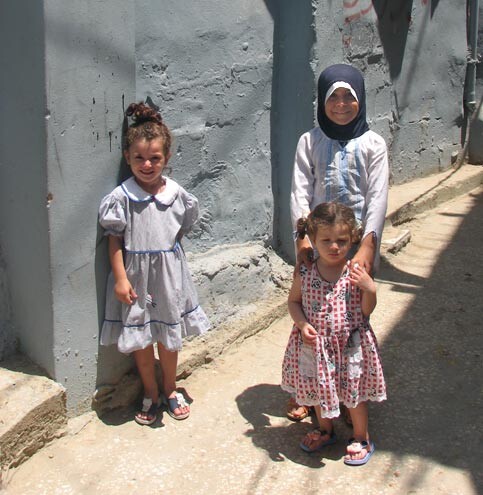
Palestinian Children, Mar Elias Refugee Camp, Beirut, Lebanon, June 2006 (Photo by Golbarg Bashi)
The world at least knows about the plight of the Palestinian refugees — that it does nothing with that knowledge is an entirely different obscenity — but Sri Lankans and Bangladeshis and Syrians and Moroccans and… these are all the nameless of the earth, abused laborers, temporary slaves, hired and fired at will, with no visible sign that they even exist.
No. Beirut was definitely beautiful, and decidedly joyous, albeit seething with pain, with abandoned hopes, hidden labor, illegal bodies suffering the indignity of an exposed and abused life — all thriving along a bustling bourgeoisie, an intellectual cantankerousness that marked anything but a moral apathy. Golbarg and I would go for our regular nightly walk at the Corniche all the way from Rawda to the oversize monument to Gamal Abd al-Naser, before we grabbed a cab and asked the driver to take us home to Fawwaz and Nawal. Life at the Corniche was full — ordinary people, some veiled, some unveiled, some poor, some rich, some young, some old—children running loose, nargilas bubbling at full blast, fresh corns hot and ready for sale, for almost nothing. Life in Beirut was full, folly, furious. Life was good.
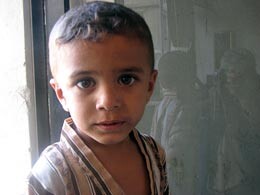
Young Palestinian Soccer Fan, Shatila Refugee Camp, Beirut, Lebanon, June 2006 (Photo by Hamid Dabashi)
All over Beirut, all over even the Palestinian refugee camps, were covered with the colorful flags of the finalists in the World Cup. We even saw flags of Saudi Arabia and the Islamic Republic of Iran raised prominently in downtown Beirut. In a souvenir shop in Shatila refugee camp selling Palestinian flags, Kufia and other memorabilia, as Golbarg was interviewing a human rights activist, three Palestinian kids — aged 4, 6, and 8 perhaps — walked in and asked the shopkeeper if she had a Brazilian flag! “No, my dears,” she said, “We have no Brazilian flag. We only have Palestinian flag. Would you like a Palestinian flag?” “No,” the oldest kid said in response, disappointed, “we don’t want any Palestinian flag. We want a Brazilian flag.”
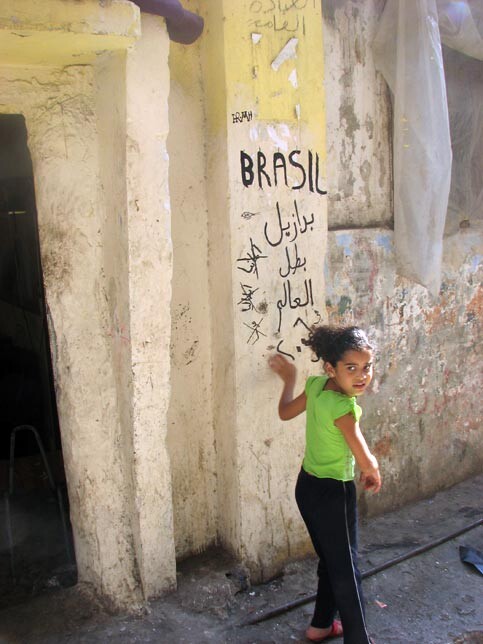
Brazilian Fan. Shatila Refugee Camp, Beirut, Lebanon, 1 July 2006 (Photo by Golbarg Bashi)
There was hope for Lebanon, when we were there — genuine, palpable, grounded.
Beautiful was Beirut in June, and when we said goodbye to our Lebanese and Palestinian friends, Beirut was hopeful, and as we boarded our plane and flew out of Rafik Hariri airport for Istanbul, Paris, and then New York, early in the morning of Sunday 2 July 2006, at about 4:00 am, Beirut was all in one piece.
Related Links
Hamid Dabashi is the Hagop Kevorkian Professor of Iranian Studies and Comparative Literature at Columbia University in New York. He has travelled extensively in Palestine, Lebanon, and the rest of the Arab world. His previous travelogue to Palestine and Lebanon, “For a Fistful of Dust: A Passage to Palestine,” was published in al-Ahram Weekly (23-29 September 2004, Issue No. 709). He is the founder of Dreams of a Nation: A Palestinian Film Project. His edited volume, Dreams of a Nation: On Palestinian Cinema (2006) will be released next month by Verso. His forthcoming book, Iran: A People Interrupted, is scheduled for publication in the Fall 2006 by the New Press.


